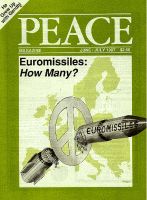
Peace Magazine Jun-Jul 1987, page 46. Some rights reserved.
Search for other articles by John Prendergrast here
By John Pendergrast
EDUCATING STUDENTS ABOUT THE NUCLEAR arms race is difficult. The subject is complex and controversial; parents may object; and the administration or the local Board of Education may not favor it. Toronto teachers have had a relatively easy time of it. They used to be encouraged by their Board, which for many years was dominated by NDP trustees. In 1983, these trustees established the Thinking and Deciding in a Nuclear Age Committee, later renamed the Critical Issues in the Curriculum Committee, to promote education on five critical issues, the nuclear arms race being the first. Since then, several in-service programs for teachers have been organized, and a wide range of classroom materials has been created.
Nuclear issues education has consequently had a high profile in Toronto. While in several respects this has been beneficial, the openness of Board support has also invited opposition. It could have been predicted that the Critical Issues Committee and the materials it generated would be accused of brainwashing or, more mildly, of bias.
Sensing its vulnerability, the Committee adopted a cautious approach from the beginning. "Balance" became the watchword. Nuclear issues education at the Toronto Board is not advocacy education. For all the controversy around them, the curriculum units on nuclear issues are not very different from units in already-existing history and politics courses. They are not "peace studies" courses. Students are urged to develop "critical thinking," not to become committed to peace, and the materials do not recommend even multilateral, much less unilateral, disarmament.
Nevertheless, the Committee and the materials it has sponsored are attacked by the local Eastern European community. Furthermore, new trustees have been elected who are sworn to remove NDP politics from the Board and the classroom, and they take this pledge seriously.
The Toronto Board does take stands on certain social issues (it is opposed to racism, for instance); possibly it might once have taken a stand against the nuclear arms race as well. That time, however, has passed. Society has shifted to the right, and the Board has shifted with it.
The Toronto Board over the past six months has in fact opposed critical issues education. A visit to Humberside Collegiate by Russians from Volgograd occasioned a tremendous anti-Russian outcry at a special Board meeting. The Canadian Coalition for Peace Through Strength has argued in a brief to the Board that Soviet expansionism, rather than the arms race, should be the focus of class discussion. The annual student conference on apartheid was attacked by trustees at the Board and was saved only by vociferous popular response.
The clamor against the Critical Issues Committee reached a climax on April 1, when a motion by trustee Ron Marks to abolish the Critical Issues Committee was passed. The Director of Education was asked to report in a year on how best to deal with critical issues material.
That report will be crucial to critical issues education. The Director is asked to consider the advisability of 1) seeking greater public input during both the writing and the reviewing process; 2) requiring that the Department of External Affairs and the Department of National Defence be invited to comment on the material when in draft form (the Ambassador for Disarmament may also be asked); 3) disqualifying as a curriculum writer anyone belonging to an organization which has taken a position on one side.
The first recommendation would paralyze the writing process, setting up battles over what is biased and what objective. Curriculum would become a political football.
The second recommendation, which suggests that curriculum be checked for conformity with government policy, denies the fundamental principle that in a democracy the government must not control school curriculum.
The third recommendation was clearly aimed at the authors of the three units on the arms race, all of whom belong to a group called Educators for Social Responsibility. This group, while proclaiming that the arms race is a crucial issue of our times and that students should be educated about it, does not advocate specific government policies. Would belonging to it disqualify future writers? What about membership in a group opposed to testing the cruise missile but not to membership in NATO (the Liberal Party)? What about a group seeking multilateral disarmament (the Progressive Conservative Party)?
All three recommendations take an issue on which no political consensus has been reached and attempt to evaluate its educational treatment on political grounds. The recommendations, if adopted, would stop teachers from bringing controversy into the classroom. Critical issues education would disappear. The trustees who voted for the motion deny that they have any such intent, but that still would be the outcome.
The fate of the critical issues materials is in doubt. And there is no reason to think that the campaign of the new Board has run its course. These are difficult days for education in Toronto.

Peace Magazine Jun-Jul 1987, page 46. Some rights reserved.
Search for other articles by John Prendergrast here